
As an enterprise with social responsibilities, starting from the goals of environmental protection and resource conservation, SF integrates technologies into its operation and actively provides supply chain services with sustainable development. Meanwhile, SF also extends the green value throughout industry chain, works with upstream and downstream partners and customers to accelerate low carbon transformation and green development for a zero carbon future.
2030
Our Commitment
2024 Key Performance
Green transportation
new-energy powered vehicles had been put into use40,000+vehiclesGreen industrial park
renewable energy generation for the year70million kWhGreen packaging
reduced paper usage by 42,000tons, plastic usage by 155,000tons through packaging reduction measuresEnvironmental Management System
The business coverage of obtaining ISO 14001 Environmental Management System Certification100%In order to reduce the impact on the environment and improve energy efficiency during transportation, SF continues to promote green and low carbon transformation of the transportation process.
In 2024,SF has reduced 479,327 tons of GHG emissions through promoting low carbon transportation.
Green Land Transportation
SF has steadily expanded the scale of its green fleet by adopting various methods such as self-purchase and leasing, gradually replaced traditional fuel transportation vehicles, and orderly promoted the green transformation and upgrading of its transportation capacity structure. In 2024, the company added nearly 9,000 new energy vehicles into operation, mainly used in diversified transportation scenarios such as short-distance branch lines, connections and terminal collection and dispatch within cities, as well as primary and secondary trunk lines across provinces and cities. As of the end of the reporting period, more than 40,000 new energy vehicles have been placed in service, with a service coverage of 253 cities.
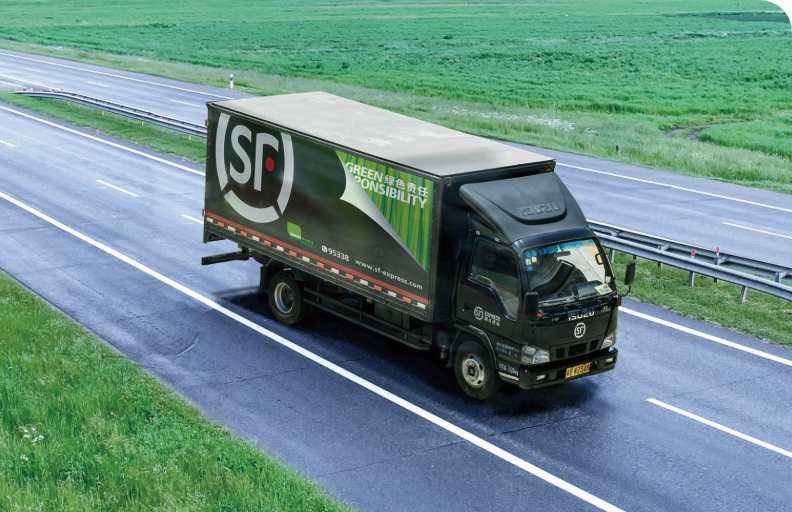
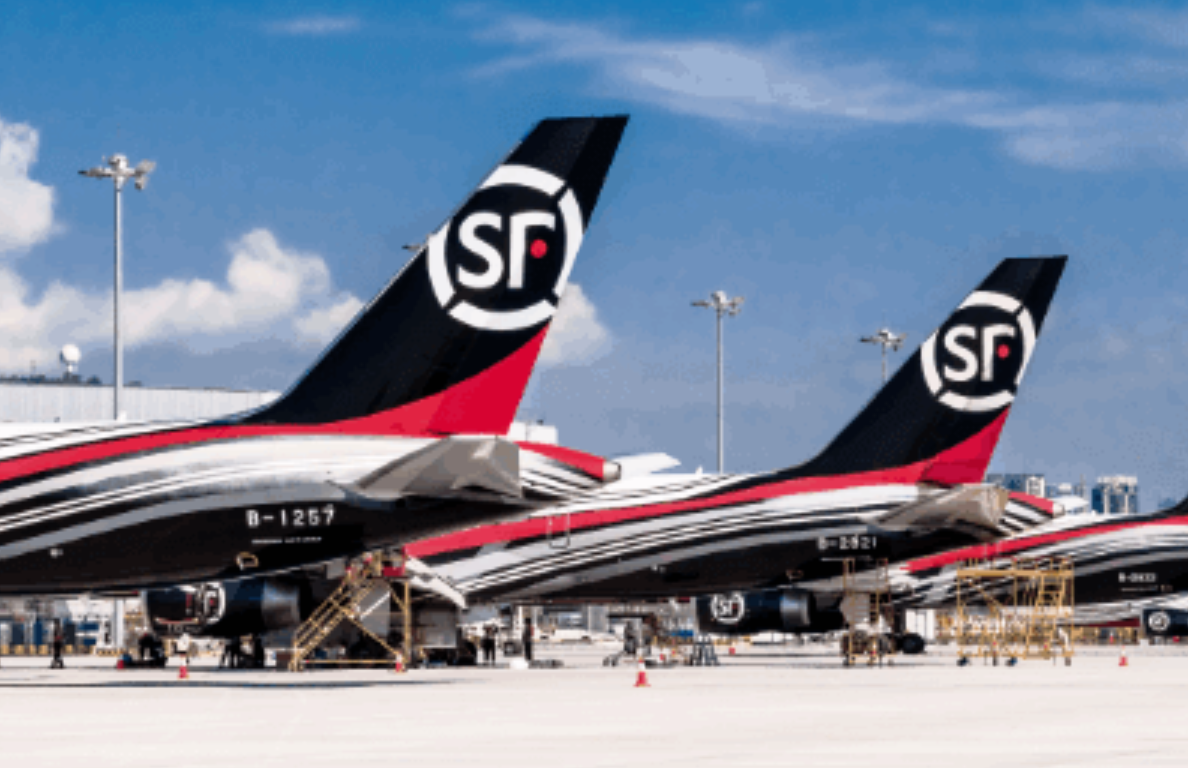
Green Aviation
SF Airlines actively implements the concept of “double control” of total energy consumption and energy consumption intensity, and steadily promotes the construction of green aviation. Starting from top-level design, the Company builds a scientific energy management structure, clarifies the responsibilities of each department, and ensures the efficient development of energy management. Additionally, the Company continues to introduce advanced management concepts and technical means, optimize the energy management system, comprehensively promote energy conservation and emission reduction in air transportation, penetrate energy conservation and carbon reduction into each aspect of flight operation, and set a benchmark for the green transformation of the industry. In 2024, SF achieved the first commercial trial flight of a domestic all-cargo aircraft using sustainable aviation fuel.

Green Land Transportation
SF has steadily expanded the scale of its green fleet by adopting various methods such as self-purchase and leasing, gradually replaced traditional fuel transportation vehicles, and orderly promoted the green transformation and upgrading of its transportation capacity structure. In 2024, the company added nearly 9,000 new energy vehicles into operation, mainly used in diversified transportation scenarios such as short-distance branch lines, connections and terminal collection and dispatch within cities, as well as primary and secondary trunk lines across provinces and cities. As of the end of the reporting period, more than 40,000 new energy vehicles have been placed in service, with a service coverage of 253 cities.

Green Aviation
SF Airlines actively implements the concept of “double control” of total energy consumption and energy consumption intensity, and steadily promotes the construction of green aviation. Starting from top-level design, the Company builds a scientific energy management structure, clarifies the responsibilities of each department, and ensures the efficient development of energy management. Additionally, the Company continues to introduce advanced management concepts and technical means, optimize the energy management system, comprehensively promote energy conservation and emission reduction in air transportation, penetrate energy conservation and carbon reduction into each aspect of flight operation, and set a benchmark for the green transformation of the industry. In 2024, SF achieved the first commercial trial flight of a domestic all-cargo aircraft using sustainable aviation fuel.
SF actively builds a green and low-carbon industrial park, focusing on green infrastructure construction and carbon reduction technology innovation, and promoting the green operation of the industrial park from many aspects such as planning and design, warehouse construction, and operation management. Through various methods such as installing roof photovoltaics, introducing intelligent water and electricity management, and optimizing warehouse space layout, the efficiency and energy-saving benefits of the transit link are comprehensively improved, and the impact of the transit link on the environment is reduced. As at the end of the reporting period, SF Changsha, Foshan, Wuhu, Wuhan, Chongqing and Jinhua industrial parks were awarded the “Class I 3-Star Green Warehouse” certification by China Warehousing and Distribution Association, Guizhou Industrial Park was awarded the “Guizhou Province Green Logistics Park” certification, and Shunxinhui Hubei Logistics Center achieving phase-one carbon neutrality certification.
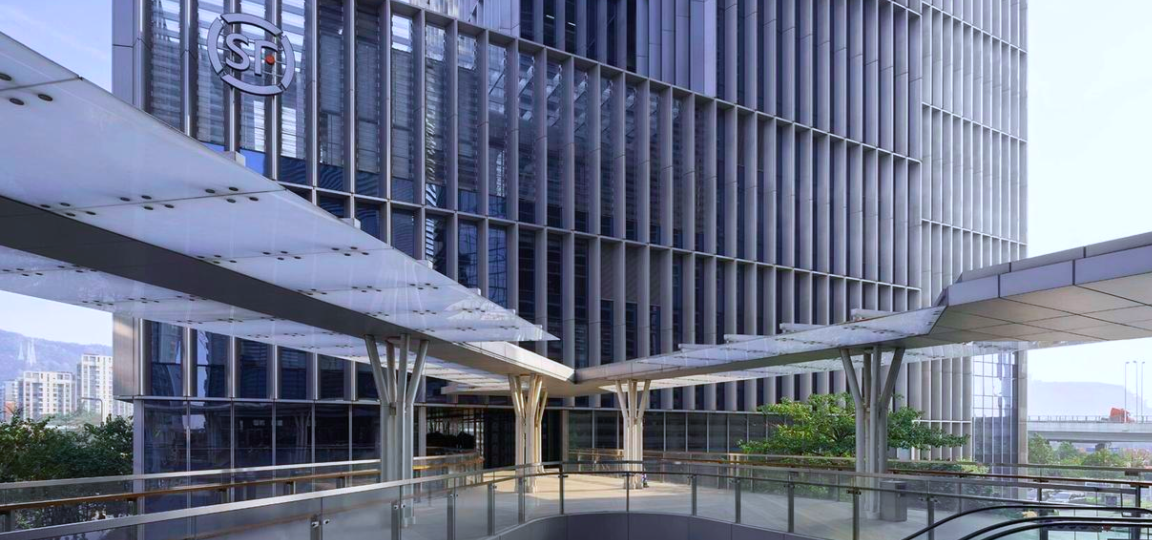
Green Industrial Parks
In order to promote the green operation of the industrial park, SF deeply integrates institutional norms with digital technology, gives full play to the synergistic effect, and comprehensively improves the industrial park from key dimensions such as operational efficiency improvement, smart energy consumption management and control, rainwater recycling, and energy-saving equipment installation. Park environmental management capabilities.
The Company has formulated the Energy Consumption Management System of Industrial Park, which relies on the intelligent hydropower system to achieve standardized management of public energy consumption and effectively improve the efficiency of resource use in the park. In order to improve the operation and management efficiency of the park, the Company has built a property system, integrating core modules such as environmental greening, security and fire management, and maintenance and testing of facilities and equipment, which has been fully applied to all operating parks to ensure the efficient and safe operation of the parks.

Renewable Energy
SF continuously strengthens the utilization of clean energy and actively formulates plans for renewable energy power generation. As of the end of 2024, the company has successfully advanced the construction of 35 photovoltaic (PV) projects in industrial parks. Among them, 24 PV projects have been put into operation, with the total installed capacity of the equipment reaching 111 megawatts (MW). The annual power generation from clean energy has exceeded 70 million kilowatt-hours (kWh), further driving the transformation and upgrading of the Company's energy structure.
SF has always implemented the green development concept of environmental protection and resource friendliness, fully integrated the low-carbon concept into office operation scenarios, continuously improved the environmental management system, formulated and implemented the Measures for the Management of Water and Electricity in Property Sites and the Measures for the Management of Regional Office Space Use, scientifically and rationally utilized resources, strengthened emission management, continuously improved employees' awareness of environmental protection, jointly created a green office environment and built a resource-saving enterprise.

Energy Management
Energy-saving equipment transformation: based on the analysis of energy consumption data in public areas of each park, SF implemented energy-saving renovation for 23 industrial parks with high lighting energy consumption in public areas. Significantly reduce lighting energy consumption in public areas by replacing intelligent sensor switches and energy-saving lamps. Additionally, operating sites are equipped with intelligent electrical box systems to accurately identify power waste during idle periods through real-time power consumption data collection and analysis, and combine automatic timing control and manual intervention to effectively reduce unnecessary power consumption. Energy Saving in Office Equipment: comprehensively promote energy-saving office equipment, optimize the number of equipment configurations, and reduce standby energy consumption. At the same time, a strict electricity consumption system is formulated, requiring employees to turn off the power supply when the equipment is not in use for a long time, cut off the power in time after charging is completed, and ensure that the power supply of all office equipment is turned off after work to avoid waste and potential safety hazards caused by overcharging.Energy monitoring management: establish a complete energy monitoring and management system, install intelligent energy metering instruments in office areas, and track power consumption data in real time. Through data analysis, we can accurately identify energy waste links, formulate targeted improvement measures, and realize the refinement and intelligence of energy management.

Water Management
SF has formulated water use management systems such as the Measures for the Management of Water and Electricity in Property Sites to standardize water use behaviors. The company sets water-saving targets aimed at maximizing water reduction and enhancing water efficiency. By strengthening the maintenance of water facilities and promoting water-saving concepts, SF enhances employees’ awareness of water conservation, controls water consumption, improves the efficiency of water resource utilization, and achieves water savings. The Company’s sources of water are all municipal water, and it does not involve the use of large quantities of water or the discharge of wastewater in the course of its operations, nor does it engage in products and businesses that are prone to cause pollution to water resources.

Waste Management
SF places great emphasis on waste management during its operations. In line with business development and the realities of daily operations, the Company sets the core goals of waste reduction at the source and enhancing the capacity for waste recycling. Company has formulated and fully implemented the waste classification system, set up clear classification signs in office areas and operation sites, and formulated clear treatment procedures for different types of waste to ensure that waste is properly disposed of and promote the full implementation of green operation. In 2024, the Company recycled 41 million used cartons and dispose of 900 tons of used work uniforms.
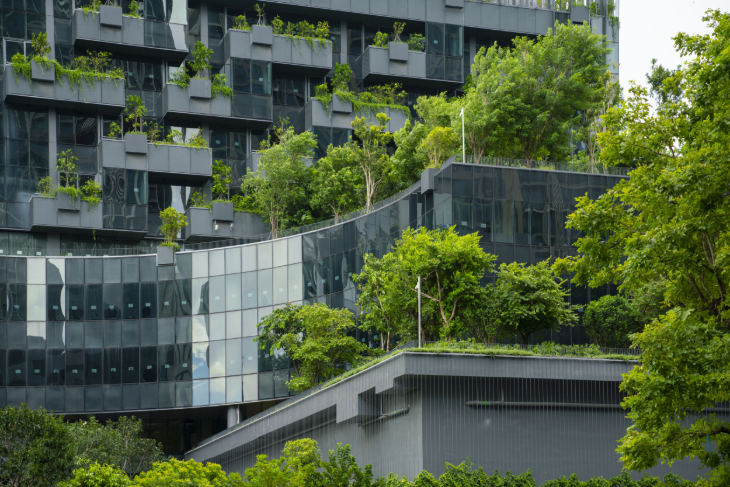
Exhaust & Noise Management
In terms of noise pollution control, SF gives priority to glass materials with noise reduction and sound insulation performance during the construction and operation of office buildings, and upgrades some equipment. In the planning and management of the industrial park, the company fully considers the actual situation of the geographical environment and population distribution of the area where the industrial park is located, and scientifically designs and installs sound insulation walls around the park to effectively isolate and reduce noise interference to the surrounding environment. In terms of exhaust emission control, SF strictly follows relevant national regulations and implements a strict vehicle access mechanism to ensure that all purchased vehicles meet environmental emission standards. In addition, by implementing a regular annual inspection system, the Company comprehensively monitors vehicle exhaust emissions to ensure that all vehicle exhaust emissions meet standards and reduce the emission of air pollutants
SF continues to deepen the field of green packaging, focusing on the cutting-edge packaging technology, and continuously increasing investment in research and development of sustainable packaging materials. By optimizing the performance of packaging materials, breaking through technical bottlenecks and expanding scenario applications, the Company strives to build a full-link solution of packaging reduction, recycling, harmlessness and standardization, and set a benchmark in the green packaging industry.
Packaging Reduction
SF focuses on eight categories of materials, such as plastic bags, adhesive tape, stickers, and seals, to carry out innovative research and development of reduction, standardization, and scenario. Through lightweight design and material structure optimization, SF significantly reduces the consumption of plastics and base paper. In 2024, through a series of packaging reduction measures, SF reduced the use of base paper by approximately 42,000 tons, reduce the use of plastics by approximately 155,000 tons, and achieve carbon emission reductions by approximately 192,000 tons.
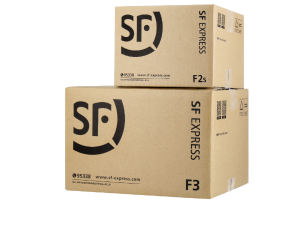
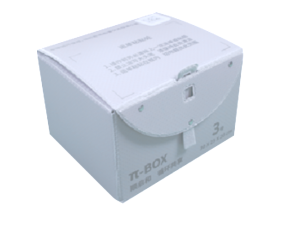
Recyclable Package
SF deeply integrates diversified business scenarios, develops modular recycling packaging containers adapted to multiple scenarios, realizes the standardized connection between containers and vehicles, significantly reduces product damage rates, shortens operation time, and improves operation efficiency. In 2024, SF invested a total of 19.18 million recycling packaging containers, of which 6.26 million newly put into recycling packaging containers, and the cumulative number of cycles exceeded 1 billion times; By providing recyclable containers, it has served a total of 430,000 customers and contributed approximately 472,000 tons of carbon emission reduction.
Bio-degradable Package
SF actively deploys the R&D of biodegradable packaging materials, cooperates with external scientific research institutions and universities, continues to deepen cutting-edge technology fields, and accumulates professional knowledge and capabilities. By carrying out multi-scenario pilot projects, the practicality and feasibility of various biodegradable materials are verified. As of the end of 2024, SF launched hundreds of millions of fully biodegradable packaging “Feng Bag”, providing a practical model for the large-scale application of green packaging.

SF continues to promote innovative practices in the circular economy, fully leveraging its influence and resource integration capabilities. Collaborating with upstream and downstream partners in the industry chain, SF builds an efficient and collaborative recycling and regeneration packaging system through resource sharing, technological collaboration, and information exchange. Meanwhile, SF actively fulfills its social responsibilities by conducting diverse environmental protection publicity and educational activities, stimulating the public’s enthusiasm and initiative to participate in environmental actions, and contributing to the construction of "Zero Waste Cities".
Recycling Express Packages
SF regards the recycling of express packaging as a key measure to promote sustainable logistics and explore “Zero Waste Cities”. By integrating internal and external resources, it comprehensively promotes the closed-loop chain verification and practice from formulating industry standards and carrying out technical research to realizing express packaging recycling, and continuously optimizes the plastic recycling process. Breaking the traditional linear model of “manufacturing-using-discarding”, the Company committed to building a full life cycle system of “plastic packaging design-production-consumption-recycling-regeneration-High-value application” to minimize the impact of waste on the environment.
SF cooperated with upstream and downstream companies to jointly overcome technical problems in express packaging, and successfully developed “Double Easy” (easy to recycle, easy to regenerate bags. This bag maintains excellent mechanical properties while incorporating up to 30% post-consumer recycled resin (PCR), in compliance with the national standards for express bags, thereby realizing the value of single-material easy recycling. SF has piloted full-process closed-loop recycling projects for plastic packaging waste in Shanghai, and joined hands with upstream and downstream industrial chains to collect discarded express bags and recycle them for granulation. Through technological innovation, realize the transformation of high-performance products and open up the circulation loop. In 2024, SF successfully completed the batch replacement of approximately 47 million “Double E” packaging bags in Beijing, promoting the large-scale implementation of circular economy
Cultivating Public Awareness of Environmental Protection
SF actively conveys the concept of green environmental protection in society and is committed to building an environmental protection ecosystem that involves public participation. By planning and carrying out various forms and rich contents of environmental protection themed activities, the Company continues to stimulate the public’s attention and enthusiasm for participation in environmental protection in innovative ways, and promote the transformation of environmental awareness from concept to action. From the “Zero Carbon Star Wish” public welfare video to the green carbon energy platform, from the carton renovation activities of the SF “Box” companion program to the “New Life for Old Shoes” program in universities, SF integrates the concept of environmental protection into the daily life of the public in diversified interactive forms. Guide all sectors of society to jointly practice green lifestyles and inject strong impetus into promoting the whole society to jointly build a “zero-carbon future”.
As an important promoter of the green and low-carbon transformation of the logistics industry, SF deeply understands the urgency and complexity of climate change, continues to pay attention to the risks and opportunities brought by climate change, and is committed to building a sustainable logistics supply chain. The Company actively responds to the national “Carbon Peak and Carbon Neutrality” strategy and the 1.5 degree Celsius temperature control target of the Paris Agreement, refers to the framework of the Task Force on Climate-related Financial Disclosures (TCFD), incorporates climate change issues into the corporate governance system, comprehensively considers the development trend of policies, industries, markets and technologies, carries out systematic identification and analysis of climate risks and opportunities, continuously strengthens climate risk management, promotes green operation transformation, and promotes sustainable development.
Governance
SF is deeply aware of the far-reaching impact of climate change on the company’s strategic planning and business operations, and regards climate change governance as an important part of the environmental, social and governance (ESG) system. The Strategy Committee of the Board is responsible for supervising and managing various sustainable development matters including climate change response, incorporating climate risks and opportunities into the Company’s strategic planning, and formulating corresponding management measures. In order to ensure the effectiveness of the implementation of various measures, the Company has incorporated quantitative indicators related to climate change into the performance appraisal system at all levels to promote the continuous improvement of the Company’s ESG governance level.
Strategy
SF comprehensively assesses short-term (0-2 years), medium-term (2-5 years) and long-term (5-10 years) climate risks and opportunities, and closely integrates risk management measures with the company’s strategic goals and action plans. Since the risks and opportunities brought by climate change are usually long-term, complex and uncertain, the Company applies scenario analysis methods to evaluate the climate risks and their financial impacts under different global temperature rise scenarios, including low emission and high emission scenarios, which provide scientific basis for the Company to formulate forward-looking and flexible risk management strategies.
Risk Management
SF deeply integrates climate change risks into the enterprise risk management framework, ensuring that climate-related risks are effectively identified, managed and disclosed. The Company regularly organizes discussions and analyses on issues related to climate change, continuously supervises and follows up on the handling of climate-related risks, continuously optimizes the risk management and control mechanism and management capabilities in daily work, and improves the Company’s ability to cope with climate risks.
Indicators & Targets
As the largest comprehensive logistics service provider in China and Asia and the fourth largest in the world, SF has always adhered to the concept of sustainable and healthy development, deeply realized the importance of participating in global climate action, actively responded to global carbon reduction initiatives, and implemented the national “Carbon Peak and Carbon Neutrality” strategy to contribute to the realization of the long-term goals of the Paris Agreement. Based on past carbon reduction achievements, SF released the industry's first Carbon Target White Paper, promising to increase its own carbon efficiency by 55% in 2030 compared with 2021, and reduce the carbon footprint of each parcel by 70% compared with 2021. In November 2023, SF officially signed and submitted the Business Ambition for 1.5°C Commitment Letter to the “Science-Based Carbon Target Initiative” (SBTi), demonstrating the company's commitment to achieving science-based greenhouse gas emission reduction targets and striving to achieve net-zero emissions in the value chain by 2050.
Zero Carbon Emission Partners: Partners on the Road to Zero Carbon Emission
We not only focus on the management of carbon emissions in our own operations but also hope that the green value extends to the supply chain, advocating and working with upstream and downstream partners and customers to join us as the 'partners on the road to zero carbon'.

Green Supply Chain 1.0
Creating Carbon Emission Transparency
SF establishes carbon emission calculation models throughout end-to-end supply chain, aiming to help customers understand the greenhouse gas emissions in transportation and logistics-related activities, enhance the transparency of carbon emission data in supply chain logistics, analyze and optimize the high emission process and achieve effective identification and control in the operation process.

Green Supply Chain 2.0
Shaping "All Green"Logistics
Business customers: We provide 'All Green' service solution and mark the "green" label on the low carbon emission products for customers to know about the low carbon emission service they use and facilitate the external display of their commitment on the environment.
Individual consumers: We provide low-carbon services for individual customers, advocate and implement an incentive mechanism to promote the use of sustainable packaging and recycled cartons.

Green Supply Chain 3.0
Building a Zero-Carbon Business Society Together
In the blueprint of achieving global carbon neutrality, it is crucial to build a zero-carbon business society. SF will share its own carbon management experience with business partners, participate in the establishment of carbon emission verification and carbon asset management-related standards in the logistics industry, and promote the financialization of carbon trading. In addition, we will invest in low-carbon technologies in support of the green investment principles to create value in sustainable development.



